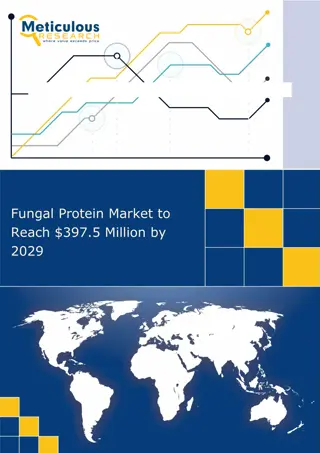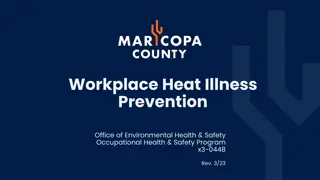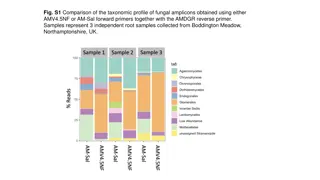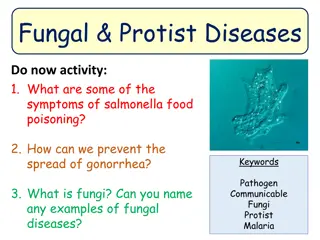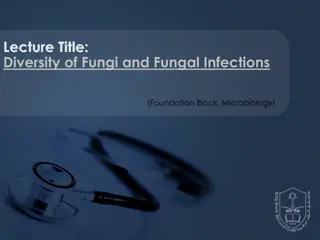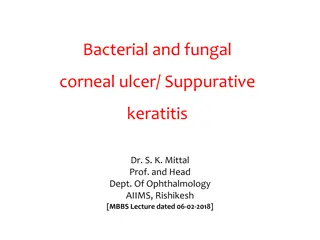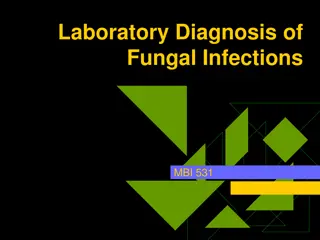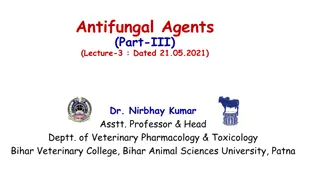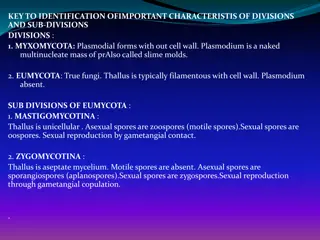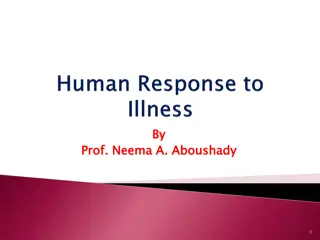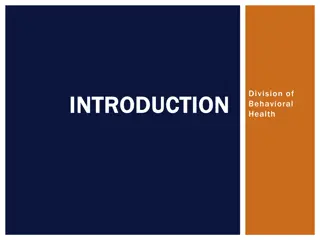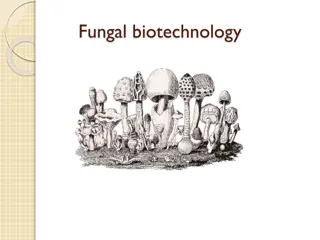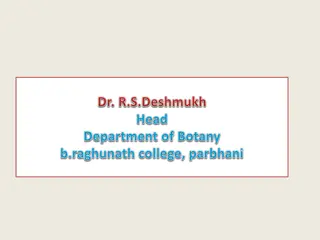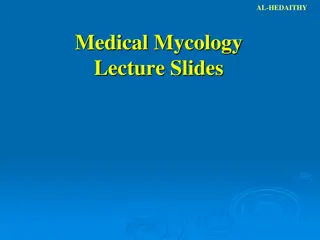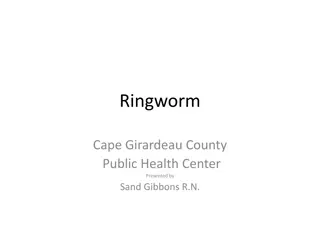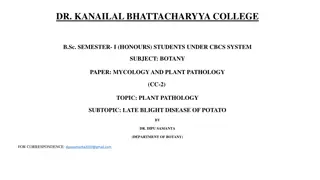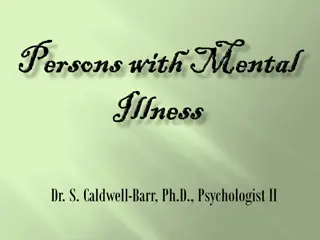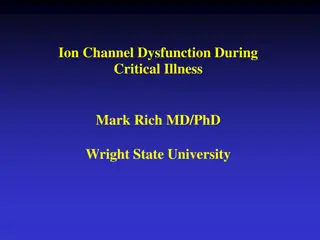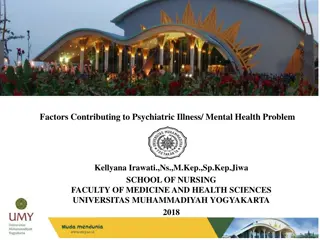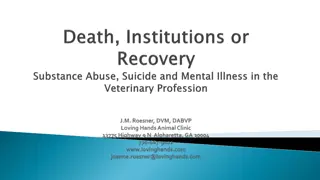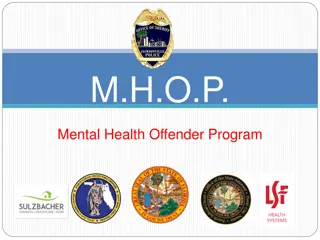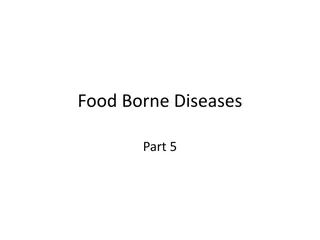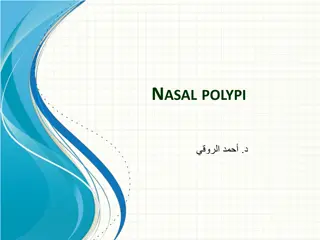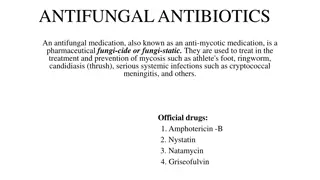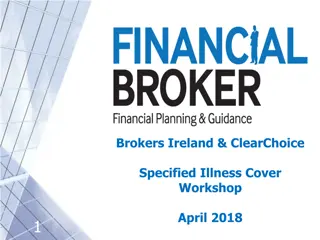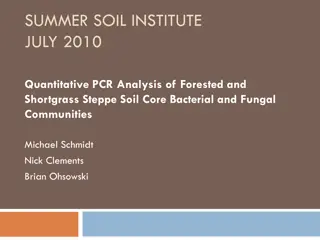The History of NAMI and the Family Movement
Founded in 1977 by two mothers seeking support for loved ones with mental illness, NAMI (National Alliance on Mental Illness) has grown to be a leading grassroots organization advocating for mental health awareness, support, and education. The Contra Costa chapter, NAMI CC, has a rich history of pro
1 views • 15 slides
Understanding Mental Health vs. Mental Illness
Explore the nuanced differences between mental health and mental illness, where mental health pertains to the quality of mental and emotional wellbeing for everyone, while mental illness refers to diagnosable conditions with long-term effects that do not affect everyone in the same way. Gain insight
9 views • 18 slides
FUNGAL SPECIES AND THEIR TOXINS.
Explore the world of fungal species and their toxins as studied by Prof. Abdullah Msaad Al-Falih at King Saud University's College of Science. Discover over 500 mycotoxins, including aflatoxins, ochratoxins, trichothecenes, fumonisins, sterigmatocystin, ergot alkaloids, zearalenone, Alternaria toxin
2 views • 8 slides
Estimation of Serious Mycoses Burden in Indonesia
This study estimates the burden of serious fungal infections in Indonesia, a country with rich biodiversity and limited medical mycology facilities. The data indicates a high prevalence of opportunistic infections in AIDS patients and TB cases, with Candidiasis and Cryptococcosis being significant c
2 views • 29 slides
Understanding Fungal Microorganisms and Their Impact on Human Health
Fungal microorganisms, including yeast and mold, play crucial roles in the human body's ecosystem. They can be both beneficial and harmful, influencing conditions like candidiasis and mycoses. Learn about the diverse forms and functions of eukaryotic organisms, their morphology, and the transition b
8 views • 33 slides
Overview of Superficial Fungal Infections of the Skin
Superficial fungal infections of the skin are categorized into superficial, cutaneous, and subcutaneous types. Superficial mycoses affect the stratum corneum and include conditions like tinea versicolor, tinea nigra, and piedra. Tinea versicolor is a chronic infection caused by Malassezia furfur, wh
3 views • 31 slides
Forecasted: Fungal Protein Market to Surpass $397.5 Million by 2029
Explore $397.5 million fungal protein market: Get exclusive insights on key market trends, segments, geographical analysis, & competitive analysis!\n
1 views • 3 slides
Workplace Heat Illness Prevention Program Overview
This workplace heat illness prevention program overview discusses risk factors, how the body handles heat, types of heat illness, prevention strategies including water consumption and shade, importance of acclimatization, emergency response procedures, OSHA standards, job and personal risk factors,
0 views • 28 slides
Fungal Diversity Analysis in Wheat Roots Using Different Primers
Comparison of fungal taxonomic profiles in wheat roots using different primers, showcasing relative abundances of Glomeromycotina and Mucoromycotina orders in different treatments and varieties. Box plots demonstrate ASV evenness, observed ASV numbers, and Shannon diversity index, revealing insights
0 views • 5 slides
Understanding Fungal and Protist Diseases: Impacts and Prevention
Fungi and protists play significant roles as pathogens, causing diseases in both humans and plants. Fungal diseases like athletes foot and protist diseases like malaria can have serious impacts on health. Control measures such as understanding symptoms, spread mechanisms, and prevention strategies a
0 views • 10 slides
Understanding Fungi Diversity and Infections in Microbiology
Explore the world of fungi and fungal infections in this foundation block of microbiology. Learn about medically important yeasts, mold fungi, major fungal diseases, antifungal agents, and infection acquisition methods. Dive into hypersensitivity reactions, mycotoxicoses, and various types of fungal
1 views • 19 slides
Overview of Bacterial and Fungal Corneal Ulcer
Bacterial and fungal corneal ulcers, known as suppurative keratitis, are a significant cause of blindness, included in national blindness control programs. They result from infections by exogenous organisms like S. aureus, S. pneumoniae, Aspergillus, and Candida. Predisposing factors include trauma,
0 views • 28 slides
Laboratory Diagnosis of Fungal Infections: Specimen Collection and Transport
In the laboratory diagnosis of fungal infections, proper collection and transportation of specimens are crucial for accurate diagnosis and treatment. Different sites and types of specimens require specific collection techniques to avoid contamination and ensure viability. From superficial to systemi
0 views • 29 slides
Understanding Azole Antifungal Agents for Veterinary Use
Azole antifungal agents play a crucial role in treating fungal infections in veterinary medicine. Imidazoles like clotrimazole and triazoles like fluconazole are commonly used for their fungistatic properties. These agents inhibit fungal enzymes, disrupting membrane fluidity and inhibiting cell repl
0 views • 14 slides
Key Characteristics of Fungal Divisions and Sub-Divisions
Identification key for important characteristics of fungal divisions and sub-divisions, including Myxomycota and Eumycota, with detailed descriptions of sub-divisions such as Mastigomycotina, Zygomycotina, Ascomycotina, Basidiomycotina, and Deuteromycotina. Focus on distinguishing features, reproduc
0 views • 13 slides
Nursing Strategies for Emotional Reactions to Illness
In this content, the focus is on understanding the stages of illness and the crucial role of nurses at each stage. It also highlights the patient's emotional needs during illness and the importance of maintaining a positive self-image. Nursing strategies for assisting patients in coping with anxiety
0 views • 8 slides
Impacts of Brassica Removal on Plant and Fungal Communities
Study on methods of Brassica removal in Coastal Sage Scrub ecosystems, evaluating effects on plant and fungal communities. Results show differences in vegetation cover, species composition, and fungal biomass with various removal techniques like herbicide, mowing, and hand-weeding.
0 views • 19 slides
Managing Physical Health in Severe Mental Illness with a Focus on Diabetes
This educational material presents a comprehensive slide set designed to aid in the management of physical health in individuals with severe mental illness, focusing on diabetes. It includes insights on the challenges faced by healthcare professionals, learning objectives on diabetes management, and
0 views • 14 slides
Fungal Microbiology Laboratory Procedures
This content provides detailed guidelines on fungal culture purification, subculturing process, preparation of microscopic slides for fungal micromorphology assessment, and isolation of human samples for diagnosing fungal infections. The procedures include steps for identifying characteristics of in
1 views • 9 slides
Understanding Involuntary Commitment Criteria for Adults with Serious Mental Illness
Involuntary commitment for adults with serious mental illness is a sensitive issue that involves specific criteria to determine if someone poses a danger to themselves or others. The criteria include having a serious mental illness, being a threat to self or others, or having an inability to provide
0 views • 67 slides
Exploring the World of Fungal Biotechnology
Fungal biotechnology involves utilizing living organisms like fungi for industrial applications, leading to the production of various valuable products such as enzymes, vitamins, and secondary metabolites. This field not only benefits industries by offering energy-efficient processes but also contri
0 views • 15 slides
Understanding the Impact of Tobacco Use on People with Serious Mental Illness
People with serious mental illness are significantly affected by tobacco use, with smoking being a leading preventable cause of early death in this population. This presentation highlights the reasons behind smoking in individuals with mental illness, challenges faced in cessation efforts, and the i
0 views • 12 slides
Introduction to Lichens: General Overview, Classification, and Economic Importance
Lichens are symbiotic organisms composed of fungi and algae, with the algal component synthesizing food while the fungal component provides structure. They have unique characteristics and are classified based on their fungal partner, thallus forms, and habitat. Ascolichens and Basidiolichens are two
0 views • 24 slides
Comprehensive Overview of Medical Mycology and Fungal Structures
Explore the field of medical mycology through lecture slides by AL-HEDAITHY covering various topics such as basic mycology, superficial mycoses, primary systemic mycoses, fungal structures, and reproduction in fungi. Dive into details about different fungal infections, their characteristics, forms o
0 views • 94 slides
Understanding Ringworm: Symptoms, Treatment, and Prevention
Ringworm, a common fungal infection, manifests as small, reddish, itchy patches that form ring-shaped lesions on the skin. It is contagious and can recur over many years if left untreated. Effective treatment involves anti-fungal topical creams or oral prescriptions in severe cases. Exclusion from s
0 views • 42 slides
Late Blight Disease of Potato: Symptoms and Management
Late blight is a severe fungal disease affecting potatoes worldwide, causing foliage damage, reduced tuber yield, and decay. It is caused by Phytophthora infestans and manifests as brownish-black lesions on plant parts. The disease spreads rapidly under humid conditions, leading to blighting of foli
0 views • 8 slides
Understanding Mental Illness and Disability Rights
This content provides insights into commonly held attitudes and beliefs about mental illness, the American with Disabilities Act of 1990, definitions of mental illness per NRS 433A.115, and interactions with individuals with mental health issues. It also covers misconceptions, the 72-hour hold for m
0 views • 60 slides
Understanding Ion Channel Dysfunction in Critical Illness
An intriguing case study presents a young male with weakness and coma in the ICU following pneumonia and sepsis. Nerve conduction results indicated critical illness myopathy and polyneuropathy, along with cardiac abnormalities. Reduced muscle excitability was attributed to a sodium channelopathy. Th
0 views • 14 slides
Factors Contributing to Psychiatric Illness and Mental Health Issues
Factors contributing to psychiatric illness and mental health problems include predisposing factors such as psychological and biological factors, as well as precipitating stressors like challenging stimuli. Mental health is defined as a state of well-being involving happiness, contentment, and effec
0 views • 15 slides
Understanding Fungal Skin Infections and Eczema/Dermatitis
Learn about fungal skin infections like Athlete's foot and ways to manage them, including symptoms, treatment options, and when to seek medical attention. Additionally, explore common skin conditions such as eczema and dermatitis, their causes, and typical symptoms in this informative guide.
0 views • 34 slides
Understanding Legal Ramifications of Mental Illness in Criminal Justice System
Mental illness presents complex challenges in the criminal justice system, impacting court rulings, constitutional issues, and perceptions of vulnerability. Cases like James Holmes and John Hinckley highlight the intersection of mental health and criminal behavior. Legal standards regarding executio
0 views • 9 slides
Understanding the Intersection of Addiction and Mental Illness in Veterinarians
Explore the profound impact of addiction and mental illness on veterinarians, highlighting the biological and environmental components, the prevalence of serious mental illness, the challenges in seeking mental health help, and the heightened risk of suicide within the veterinary profession. Promote
0 views • 28 slides
Mental Health Offender Program: Addressing Mental Illness in the Criminal Justice System
A pilot program, M.H.O.P., aims to reduce the burden on the criminal justice system by providing pretrial release, personalized care plans, and court supervision for defendants with mental illness. By addressing the needs of the mentally ill, the program strives to break the cycle of criminal behavi
0 views • 21 slides
Understanding Fungal and Chemical Food-Borne Intoxications
Fungal intoxications are caused by mycotoxins produced by fungi in improperly stored food, with aflatoxicosis being a significant concern. Aflatoxins can lead to acute hemorrhagic syndromes and long-term liver tumors. Prevention strategies include proper drying and storage of foods. Chemical food-bo
0 views • 19 slides
Understanding Nasal Polypi and Their Classifications
Nasal polyps are simple oedematous growths in the nasal mucosa that can be unilateral or bilateral. They are classified into simple nasal polyps, fungal polyps, and malignant polyps. Simple nasal polypi, also known as inflammatory polyps, include ethmoidal polyps and antrochoanal polyps. Fungal poly
0 views • 18 slides
Understanding Antifungal Inhibitors and Drugs
In this detailed overview, we explore antifungal inhibitors and drugs, including their mechanisms of action, impact on eukaryotes and prokaryotes, common agents affecting fungal sterols and cell walls, as well as synthetic antifungals. From polyenes like nystatin to azoles such as voriconazole, this
0 views • 12 slides
Overview of Antifungal Antibiotics and Their Uses
Antifungal antibiotics are crucial medications used to treat and prevent various fungal infections such as athlete's foot, ringworm, candidiasis, and systemic infections like cryptococcal meningitis. This article discusses key antifungal medications including Amphotericin-B, Nystatin, Natamycin, and
0 views • 6 slides
Enhancing Advising Process for Specified Illness Cover Workshops
Guidance on developing a structured process for advising on Specified Illness Cover, addressing challenges faced by financial brokers in selling and positioning the product. Workshop objectives include client engagement, research, explaining benefits, and product understanding. The content covers ag
0 views • 53 slides
Analysis of Bacterial and Fungal Communities in Forested and Shortgrass Steppe Soil
The study conducted in July 2010 at the Summer Soil Institute involved a Quantitative PCR analysis of bacterial and fungal communities in Forested and Shortgrass Steppe Soil. The research compared the microbial DNA extracted from different sites and depths in these ecosystems, using techniques such
0 views • 14 slides
Understanding Health Anxiety: Causes, Symptoms, and Impacts
Health anxiety, also known as illness anxiety or hypochondria, is characterized by obsessive worry about having a serious medical condition. Individuals with health anxiety misinterpret minor body sensations as symptoms of a severe illness, despite reassurance from medical professionals. This condit
0 views • 16 slides






